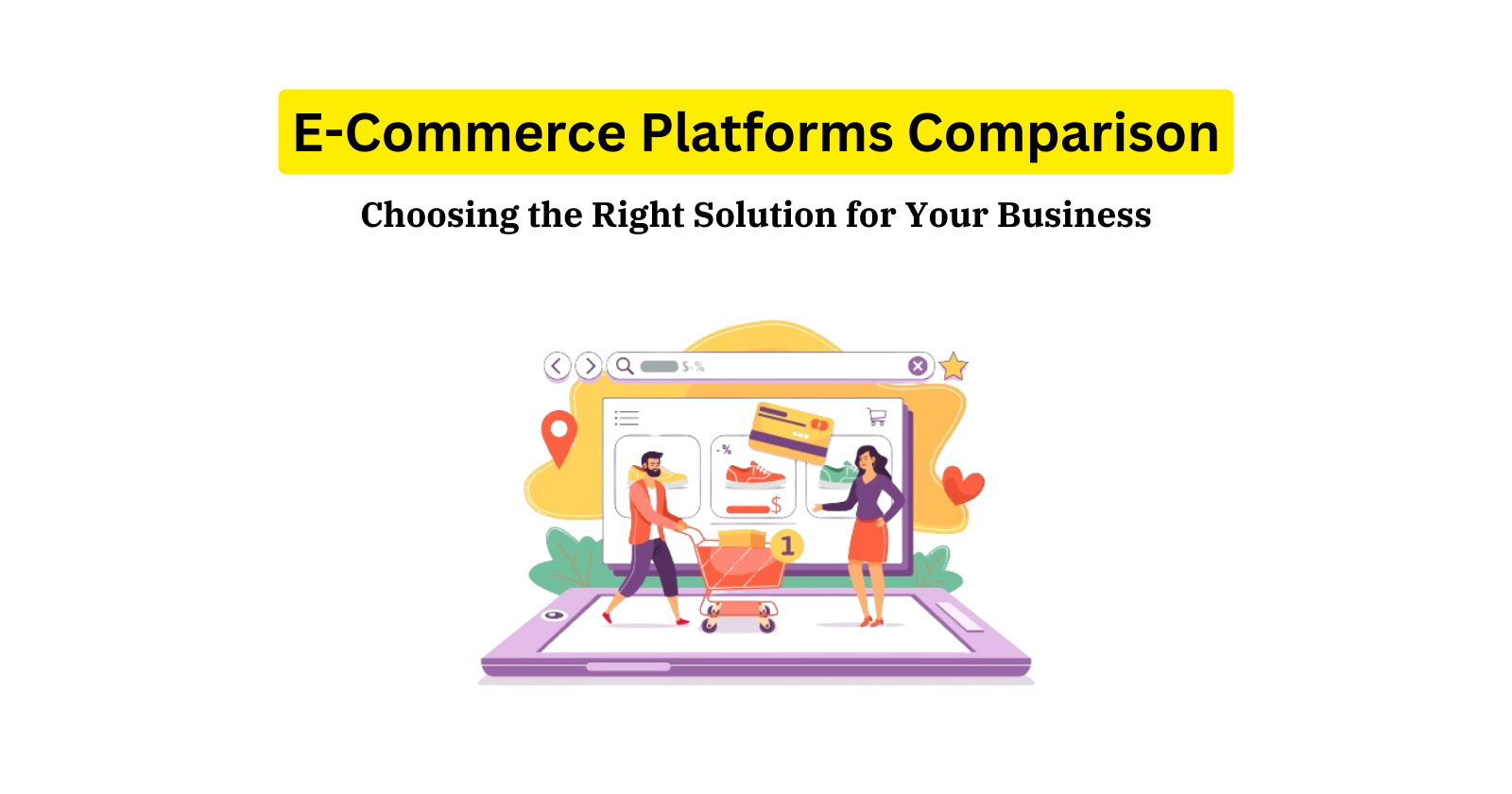I. Introduction
A. Importance of selecting the right e-commerce platform
B. Overview of the article's purpose
II. Factors to Consider
A. Business requirements
B. Budget considerations
C. Scalability and growth potential
D. Customization and flexibility
E. User interface and experience
F. Integration capabilities
G. Security features
H. Customer support and community
III. Popular E-Commerce Platforms
A. Shopify
1. Features and benefits
2. Pricing structure
3. User reviews and testimonials
B. WooCommerce (WordPress)
1. Features and benefits
2. Pricing structure
3. User reviews and testimonials
C. Magento
1. Features and benefits
2. Pricing structure
3. User reviews and testimonials
D. BigCommerce
1. Features and benefits
2. Pricing structure
3. User reviews and testimonials
E. Wix
1. Features and benefits
2. Pricing structure
3. User reviews and testimonials
IV. Comparison Analysis
A. Side-by-side comparison of key features
B. Pros and cons of each platform
C. Case studies or real-world examples
V. Decision-Making Process
A. Identifying top priorities
B. Conducting a thorough evaluation
C. Seeking expert advice if necessary
VI. Conclusion
A. Recap of important considerations
B. Encouragement for informed decision-making
C. Final thoughts on selecting the right e-commerce platform for your business
VII. References
A. Citations for sources used in the article
B. Additional resources for further reading

Introduction
Choosing the right e-commerce platform is critical for companies looking to succeed in the competitive online market in the current age of digital commerce. The selected platform may have a big impact on many different parts of the business, from data security and general prosperity to user interface and scalability. Therefore, making this crucial choice requires careful thought and thorough analysis.
The goal of this post is to provide a comprehensive manual for managing the complex world of Shopify App Development platforms. Understanding the nuances of various e-commerce solutions becomes essential, regardless of your level of experience as a business owner and whether you are starting your first online shop or want to update your current digital infrastructure.
In this post, we will also learn about various critical elements that can help you make a wise decision. In addition, we will carefully analyze the benefits and features of well-known e-commerce platforms and guide how to make decisions about these choices. At the end of this trip, you will have the necessary information and tools to identify and choose the e-commerce platform that most closely aligns with your goals and dreams for your business.
Come with us as we explore the world of e-commerce platform selection, allowing you to make wise decisions that open doors for your company to flourish in the changing online commerce sector.
Part I: Factors to Consider
Before you go into the particulars of various e-commerce platforms, it is essential to have a good understanding of the important variables that need to affect your selection process. By thoroughly analyzing these elements up front, you'll be in a better position to choose which platform is most appropriate for your particular set of company requirements. Let us explore these things more thoroughly:
1. Business Requirements:
Clearly defining your company requirements is a must before choosing an e-commerce platform. Think about things like the kinds of goods you sell, who your target market is, and your long-term growth goals. A platform that offers various customization choices and strong product management skills is necessary, for example, if your goal is to sell a broad range of items with different qualities.
2. Budget Considerations:
Which e-commerce platform is best for your business will depend in large part on your budget. While some systems provide simple capabilities and reasonable pricing plans, others can need a larger investment yet offer more sophisticated functionality and scalability. Realistically evaluate the features that will yield the most return on investment for your company while giving top priority to those that do not.
3. Scalability and Growth Potential:
Your e-commerce platform should be sufficiently flexible to handle growing traffic, sales volume, and product catalog size as your business grows. As your company expands, look for platforms that provide flexibility and scalability so you can add new features or upgrade your plan. Take into account the platform's network of extensions and integrations as well, as they can improve its scalability and flexibility in response to changing business requirements.
4. Customization and Flexibility:
Because no two companies are the same, your e-commerce platform should showcase your company's personality and branding. Select a platform that gives you lots of customization choices so you may modify the appearance, organization, and features of your online store to fit your tastes. Flexibility is essential for developing a unique and engaging online shopping experience, whether it is by integrating third-party apps, personalizing product pages, or putting promotional plans into action.
5. User Interface and Experience:
Your e-commerce platform's user interface and experience (UI/UX) are important for drawing in new clients and keeping existing ones. It is also important to choose a platform that provides quick page load, is responsive, and provides easy navigation. In addition to increasing consumer happiness, a smooth and intuitive shopping experience also leads to increased conversion rates and recurring business.
6. Integration Capabilities:
Integrating your e-commerce platform with external tools and services can improve its usefulness and efficiency. Be it payment gateways, shipping companies, marketing automation tools, or analytics platforms—make sure the e-commerce platform you select has strong integration features to optimize your business processes and boost productivity.
7. Security Features:
Security is an essential concern for e-commerce companies due to an increasing number of cyberattacks and data breaches. Select a platform that uses strong security features like PCI compliance, SSL encryption, and frequent security upgrades. To secure your online business and win over customers, you should also think about fraud prevention technologies, data backup and recovery solutions, and customer data security policies.
8. Customer Support and Community:
Finally, take into account the e-commerce platform provider's degree of community resources and customer support. Along the journey, you'll undoubtedly run across technological problems, queries, or difficulties. In these situations, having access to helpful customer care might be crucial. Seek out platforms that have extensive support channels, including email support, live chat, knowledge base articles, and community forums, so that you may ask questions, get help with problems, and interact with other merchants.
You'll be in a better position to choose the e-commerce platform that fits your budget, desires for development, and company objectives if you carefully consider these aspects. We'll go into the characteristics and advantages of well-known e-commerce platforms in the parts that follow, allowing you to make an informed choice that will pave the way for your success online.
Part II: Popular E-Commerce Platforms
Now that you know the most important things to look for in an e-commerce platform, let's take a closer look at some of the most well-liked choices on the market right now. Every platform serves a variety of companies and sectors and has its features, advantages, and cost structures. You may learn a lot about which of these platforms best suits your needs by looking at their distinctive offers.
Let us now have a look at the advantages as well as the attributes of e-commerce platforms.
1. Shopify:
Renowned for its endless ecosystem of applications and connectors, strong functionality, and user-friendly design, Shopify is a top e-commerce platform. Users without any coding experience can set up their store online, add and manage products, and handle orders with ease. In addition to offering a variety of price options to accommodate companies of all sizes, the platform also has a vibrant merchant community and committed customer service.
2. WooCommerce (WordPress):
Woocommerce is undoubtedly one of the most popular plugins used to create e-commerce websites on WordPress. The plugin is quite flexible and comes with various customizable solutions. As WordPress is an open-source platform, users can make use of WooCommerce to create an online store they have always dreamt of. The plugin is quite easy to instal and can be customized based on the products or services offered. With a little coding experience, the plugin can also be tailored to fit the existing theme of your website.
3. Magento:
Renowned for its enterprise-level capabilities, scalability, and flexibility, Magento is a powerful e-commerce platform. Magento has comprehensive built-in features for managing items, orders, and customer connections, strong performance capabilities, and many customization choices. It is designed for enterprises with complicated requirements and huge traffic levels. While Magento offers unrivaled scalability and customization options for ambitious enterprises, its setup and maintenance need a greater degree of technical competence.
4. BigCommerce:
BigCommerce is an e-commerce platform that works on the cloud and serves companies of all kinds, from start-ups to large corporations. Without requiring a great deal of technical know-how, BigCommerce's built-in functionality, straightforward UI, and seamless connections make it simple to start and grow an online store. To assist businesses in thriving in the competitive world of e-commerce, the platform provides customizable pricing plans, cutting-edge marketing tools, and attentive customer service.
5. Wix:
Popular website builder Wix allows businesses to easily construct professional-looking online storefronts by integrating e-commerce features. Wix comes with an easy to use drag and drop interface, and it is perfect for users who do have any coding or technical experience. Wix offers a user-friendly alternative for small and medium-sized enterprises wishing to quickly and economically build an online presence, even though it might not have as many sophisticated features as other platforms.
All the e-commerce platforms mentioned here have both pros and cons and understanding the same will help you choose one based on your long-term goals, as well as the needs of your business. To assist you in making an informed choice, we will compare these platforms in the next portion of the post, stressing their salient characteristics, cost plans, and user feedback.
Part III: Comparison Analysis
Now that we've explored the features and benefits of popular e-commerce platforms, it's time to conduct a comparative analysis to determine which one best meets your business needs. In this section, we'll provide a side-by-side comparison of key features, pricing structures, and user reviews for each platform, empowering you to make an informed decision. Let's dive into the details:
1. Shopify:
Features: Shopify provides a wide variety of services, including fully adjustable storefront designs, safe payment processing, order fulfillment, inventory control, and marketing tools like discount coupons and abandoned cart recovery.
Pricing: Shopify has levels of pricing, with basic features starting at $29 per month and ramping up to $299 for bigger transaction volumes and advanced capabilities.
User Reviews: Shopify is well-known for its simple user interface, sizable app store, and dependable customer service. Users value its extensive feature set, adaptability, and scalability.
2. WooCommerce (WordPress):
Features: For creating and improving your online store, WooCommerce offers a plethora of customization possibilities, a smooth WordPress interface, and dozens of plugins and themes.
Pricing: As a WordPress plugin, WooCommerce is free to use, but you'll have to pay for web hosting, domain registration, and any other premium plugins or themes you decide to use.
User Reviews: Customers value WooCommerce's scalability, adaptability, and WordPress integration. Without technical knowledge, some users find it difficult to set up and maintain.
3. Magento:
Features: Magento supports big product catalogs and high traffic levels in addition to providing enterprise-level functionality, multi-store capabilities, and complete customization possibilities.
Pricing: Magento has a premium industrial version (Magento Commerce) with pricing based on specific business requirements, as well as a free open-source version (Magento Open Source).
User Reviews: Magento's large feature set, flexibility, and scalability are highly recognized. Users do point out that it can be difficult to set up and manage, needing resources and technical know-how.
4. BigCommerce:
Features: BigCommerce provides a user-friendly interface, built-in features for SEO, marketing, and analytics, and seamless integrations with leading payment gateways and shipping providers.
Pricing: BigCommerce offers tiered pricing plans starting from $29.95 per month for basic features and scaling up to custom enterprise plans with advanced functionality and support.
User Reviews: Users commend BigCommerce for its ease of use, responsive customer support, and robust feature set. A few users often complain that the price is higher when compared to other similar platforms.
5. Wix:
Features: Wix offers a drag-and-drop website builder, customizable templates, built-in e-commerce functionality, and a range of marketing and SEO tools for promoting your online store.
Pricing: Wix has various plans that users can choose from. The basic plan starts at $23 a month and the same can be increased to $49 a month if the user opts for advanced features.
User Reviews: Wix provides various templates, is quite user-friendly, and is quite affordable at the same time. However, some users find the e-commerce features to be less robust compared to dedicated e-commerce platforms.
Let us now have a look at the decision-making process and other resources in the article's last part to help you choose the best e-commerce platform for your company.
Part IV: Decision-Making Process
After reviewing the attributes, costs, and customer feedback of well-known e-commerce sites, it's time to start selecting a choice. The following actions will help you to complete this process:
1. Identify Top Priorities:
You can start by listing out the features you wish to incorporate in your e-commerce store. Take into account elements like budgetary restrictions, integration capabilities, scalability, and customization alternatives. You can focus on assessing systems that closely match your company's demands by ranking your requirements.
2. Conduct a Thorough Evaluation:
Next, using your goals as a guide, thoroughly assess each e-commerce platform. Utilize online resources, demos, and free trials to learn more about the capabilities, usability, and features of the platform. Pay special attention to features like interoperability with your current systems and workflows, customization choices, and simplicity of use.
3. Seek Expert Advice if Necessary:
Consult a professional if you're unclear about which platform is ideal for your company. Seek advice from e-commerce specialists, colleagues in the field, or technological partners who can provide ideas and insights based on their knowledge and experience. A web developer or e-commerce consultant might also be hired to help with the installation and choice process.
4. Consider Long-Term Implications:
Think about how choosing an e-commerce platform will affect your company in the long run. Examine the scalability, adaptability, and upgrade possibilities of each platform to make sure it can support your goals for future development and expansion. To calculate the overall cost of ownership over time, make sure to account for the expenses of continuing maintenance, support, and upgrades.
5. Make an Informed Decision:
Make a knowledgeable decision about which e-commerce platform best suits your needs and objectives as a business using the information you gained from your assessment and consultation. When you get to a final option, take into account elements like functionality, cost, usability, support, and reputation. Recall that choosing the appropriate platform may affect your company's long-term success and is not just a financial but also a strategic choice.
These guidelines will help you make a strict decision-making process and help you choose the e-commerce platform that best suits your needs in terms of development aspirations, budget, and company objectives. We'll provide some further resources and advice to help you on your e-commerce journey in the article's last part.
Part V: Conclusion
After negotiating the complex world of e-commerce platforms, you now possess the information and resources needed to decide on the best course of action for your company. Let's review the most important lessons we learned from our investigation and provide some closing remarks in this part.
1. Recap of Important Considerations:
We began by highlighting the importance of selecting the right e-commerce platform and outlined key factors to consider, including business requirements, budget considerations, scalability, customization, user experience, integration capabilities, security, and customer support.
Next, we conducted a comparative analysis of these platforms, offering insights into their strengths and weaknesses to assist you in making an informed decision.
Finally, we outlined a decision-making process, guiding you through the steps of identifying priorities, conducting evaluations, seeking expert advice, considering long-term implications, and making a confident decision.
2. Encouragement for Informed Decision-Making:
Choosing a suitable e-commerce platform can impact the success of your business directly. By taking a strategic and methodical approach to the decision-making process, you can mitigate risks, maximize opportunities, and position your business for growth and success.
It is important to do thorough research on the features as well as capabilities of various platforms before you pick one. Seek guidance from experts and leverage online resources to support you in this journey.
3. Final Thoughts:
Embrace the journey with confidence, knowing that you have the knowledge, resources, and support to make the best decision for your business. As you embark on this exciting chapter, may your chosen e-commerce platform catalyze success, enabling you to reach new heights and achieve your business goals.
Part VII: References
In the process of researching and evaluating e-commerce platforms for your business, it's essential to consult reliable sources and references to inform your decision-making process. You can make sure of the references as well as sources mentioned below as support on your e-commerce journey.
Platform Documentation and Guides: Explore the official documentation, user guides, and tutorials provided by each e-commerce platform. These resources offer valuable insights into platform features, setup instructions, and best practices for optimizing your online store.
Customer Reviews & Testimonials: Read customer reviews and testimonials from those who have already used the platform you are planning to choose. Platforms like G2, Trustpilot, and Capterra provide unbiased reviews as the ratings are given by real people based on their experience.
Industry Publications and Blogs: Websites like eCommerceFuel, Practical Ecommerce, and Shopify's blog offer valuable insights, case studies, and expert advice on e-commerce strategies and technologies.
Online Communities & Forums: It is also important to engage in conversations with developers, e-commerce store owners, and experts of various forum communities. Platforms like Reddit, Stack Overflow, and LinkedIn groups provide opportunities to ask questions, share insights, and connect with peers in the industry.
Consultation with Experts: Consider seeking guidance from e-commerce consultants, web developers, and technology partners who specialize in e-commerce platform selection and implementation.
Furthermore, it's advisable to engage with the support teams and representatives of the e-commerce platforms under consideration. They are equipped to provide additional clarification, address specific queries, and extend assistance in evaluating how well their platform suits your business requirements.



















 Digital Marketing Company In Delhi
Digital Marketing Company In Delhi  Graphic Design Company
Graphic Design Company  App Development In Delhi
App Development In Delhi  Content Writing Services
Content Writing Services  Affiliate Marketing
Affiliate Marketing  Flutter App Development Company
Flutter App Development Company  Android App Development
Android App Development  Branding Company
Branding Company  Digital Marketing In India
Digital Marketing In India  Digital Marketing In Ahmedabad
Digital Marketing In Ahmedabad  Digital Marketing In Pune
Digital Marketing In Pune  AI Services
AI Services 




